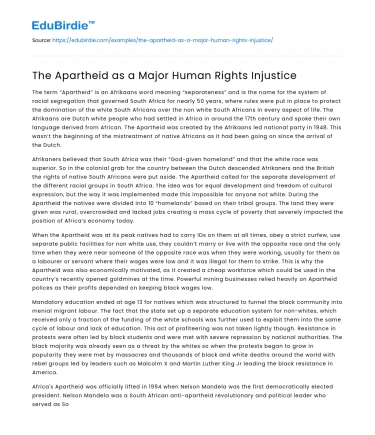The term “Apartheid” is an Afrikaans word meaning “separateness” and is the name for the system of racial segregation that governed South Africa for nearly 50 years, where rules were put in place to protect the domination of the white South Africans over the non white South Africans in every aspect of life. The Afrikaans are Dutch white people who had settled in Africa in around the 17th century and spoke their own language derived from African. The Apartheid was created by the Afrikaans led national party in 1948. This wasn’t the beginning of the mistreatment of native Africans as it had been going on since the arrival of the Dutch.
Afrikaners believed that South Africa was their “God-given homeland” and that the white race was superior. So in the colonial grab for the country between the Dutch descended Afrikaners and the British the rights of native South Africans were put aside. The Apartheid called for the separate development of the different racial groups in South Africa. The idea was for equal development and freedom of cultural expression, but the way it was implemented made this impossible for anyone not white. During the Apartheid the natives were divided into 10 “homelands” based on their tribal groups. The land they were given was rural, overcrowded and lacked jobs creating a mass cycle of poverty that severely impacted the position of Africa’s economy today.
Save your time!
We can take care of your essay
- Proper editing and formatting
- Free revision, title page, and bibliography
- Flexible prices and money-back guarantee
When the Apartheid was at its peak natives had to carry IDs on them at all times, obey a strict curfew, use separate public facilities for non white use, they couldn’t marry or live with the opposite race and the only time when they were near someone of the opposite race was when they were working, usually for them as a labourer or servant where their wages were low and it was illegal for them to strike. This is why the Apartheid was also economically motivated, as it created a cheap workforce which could be used in the country’s recently opened goldmines at the time. Powerful mining businesses relied heavily on Apartheid polices as their profits depended on keeping black wages low.
Mandatory education ended at age 13 for natives which was structured to funnel the black community into menial migrant labour. The fact that the state set up a separate education system for non-whites, which received only a fraction of the funding of the white schools was further used to exploit them into the same cycle of labour and lack of education. This act of profiteering was not taken lightly though. Resistance in protests were often led by black students and were met with severe repression by national authorities. The black majority was already seen as a threat by the whites so when the protests began to grow in popularity they were met by massacres and thousands of black and white deaths around the world with rebel groups led by leaders such as Malcolm X and Martin Luther King Jr leading the black resistance in America.
Africa's Apartheid was officially lifted in 1994 when Nelson Mandela was the first democratically elected president. Nelson Mandela was a South African anti-apartheid revolutionary and political leader who served as South Africa’s President from 1994 to 1999 and died at age 95 in 2013.
To sum it up the Apartheid was a large injustice of human rights fueled by the idea of a master race and the money and greed of powerful people who thrived off the cheap labour of the coloured. All this may seem far in the past but the fact is that for the human race we’ve only recently overcome this policy and are still are far from undoing the damage it has caused to society around the world. There's no point in apologising for something we can’t fix now, but there is one in helping to make it better for the future.
Did you like this example?
Make sure you submit a unique essay
Our writers will provide you with an essay sample written from scratch: any topic, any deadline, any instructions.
Cite this paper
-
APA
-
MLA
-
Harvard
-
Vancouver
The Apartheid as a Major Human Rights Injustice.
(2022, August 25). Edubirdie. Retrieved December 22, 2024, from https://edubirdie.com/examples/the-apartheid-as-a-major-human-rights-injustice/
“The Apartheid as a Major Human Rights Injustice.” Edubirdie, 25 Aug. 2022, edubirdie.com/examples/the-apartheid-as-a-major-human-rights-injustice/
The Apartheid as a Major Human Rights Injustice. [online].
Available at: <https://edubirdie.com/examples/the-apartheid-as-a-major-human-rights-injustice/> [Accessed 22 Dec. 2024].
The Apartheid as a Major Human Rights Injustice [Internet]. Edubirdie.
2022 Aug 25 [cited 2024 Dec 22].
Available from: https://edubirdie.com/examples/the-apartheid-as-a-major-human-rights-injustice/
copy






 Stuck on your essay?
Stuck on your essay?

